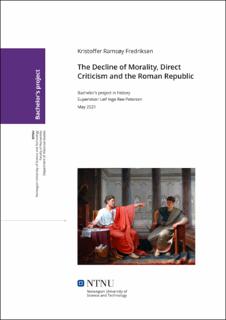The Decline of Morality, Direct Criticism and the Roman Republic
Abstract
Denne oppgaven ser på bruken av ytringsfrihet I den sene romerske republikken og det tidlige romerske imperiet, med formal å utforske om det er noen nevneverdige forandringer, samt hva som forårsaket disse forandringene. Den bruker fire nevneverdige historiske figurer. Catull, Cicero, Ovid og Vergil og gjennom dem, deres skriving og deres liv blir libertas som en dyd innebefattende ytringsfrihet utforsket. Den definerer også ytringsfrihet som en del av libertas og hvordan det påvirket romersk politikk
Igjennom teksten blir det tydelig at moral, og dets nedgang, skulle spille en stor rolle i Augutus’ politikk når han gjorde en stor innsats for å ‘redde’ the romerske republikken. Derfor spilte han også en stor rolle i å definere ytringsfrihet, og dets bruk i denne perioden. Da det ble tydelig at skriver, poeter og tlaere ikke lenger var så frie som de hadde vært.
Ovid’s eksil markerer et skifte hvor de bevegde seg mot indirekte kritikk, hvor folk ikke lenger ville direkte sette seg imot ideer og vedtak, men heller alludere og hinte til motstand, som vi for eksempel kan se med Vergil. Oppgaven konkluderer med at det var en forandring i ytringsfriheten, og den markerte nedgangen av direkte kritikk The thesis looks at the utilization of free speech in the late roman republic and early empire, with the purpose to investigate any notable changes, as well as cause to these changes. It uses four notable historical figures. Catullus, Cicero, Ovid and Virgil, and through them, their writing and their life explores the impact of the libertas a virtue that include free speech. It also defines free speech as a facet of libertas and how it affected roman politics.
Throughout the text it becomes clear that a morality, and the decline thereof, would play a major part in the politics of Augustus as he made huge efforts to “save” the roman republic. He also then played a major role in the defining of free speech’s use in this period, as it became clear that writers, poets and orators was not so free as they once were.
Ovid’s exile marks a shift towards indirect criticism, where people no longer would directly oppose ideas and policies, but rather allude and hint towards opposition, like we see with for example Vergil. The thesis then concludes that there was a change in the use of free speech, as it marked the decline of direct criticism.
